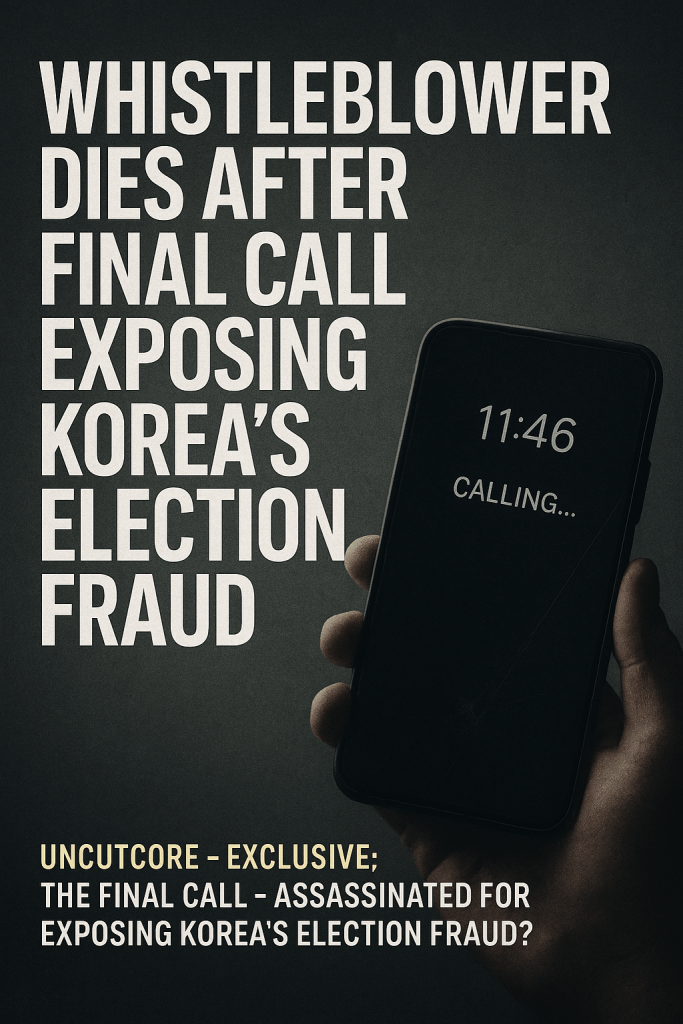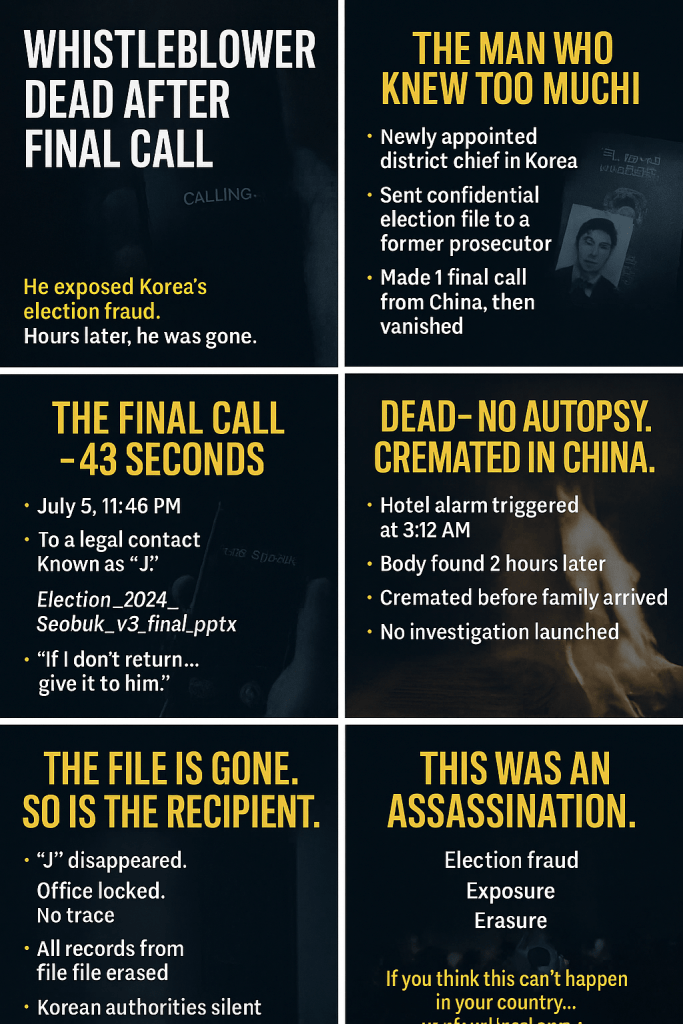
July 5, 2025 – 11:46 PM (KST)
One day before his body was found in a Chinese hotel room,
a South Korean district chief made a single phone call from his personal secondary phone, using a Korean SIM card.
The call lasted 43 seconds.
The recipient?
A former government prosecutor, known internally as “J.”
That call has never been recovered.
But telecom logs, hotel Wi-Fi records, and system pings confirm the connection.
This is not theory. This happened.

What We Know
The following timeline is based on insider documents, leaked government memos, and forensic metadata analysis.
| Time | Event |
|---|---|
| 11:46 PM | Outgoing call from China to Korean number (confirmed) |
| 11:47 PM | Call ends abruptly after 43 seconds |
| Between 12:00–3:00 AM | No digital activity from either of his two phones |
| 3:12 AM | Emergency alarm triggered inside hotel suite |
| 5:01 AM | Hotel staff finds him unconscious in the bathroom |
| 6:30 AM | Pronounced dead on site — no autopsy ordered |
| 10:00 AM | Cremated in China. Ashes returned. Case closed. |
The File He Mentioned
According to partial transcripts provided by a confidential source in the Korean judiciary system,
the 43-second call included a mention of a digital file:
“The one I sent you yesterday…
If anything happens to me, give it to him. Please.”
— Final words (reconstructed)
The file in question:
Election_2024_Seobuk_internal_v3_final.pptx
It was emailed from his encrypted personal account just 28 hours before his death.
The recipient—“J”—has since gone silent. Disconnected phones. Office closed. Family unreachable.
What Was in the File?
Leaked fragments suggest the file contained:
- Polling station footage timestamps vs missing logs
- Discrepancies in voter registry files
- Screenshots of internal communication instructing vote count halts
- Names. Directives. And possibly, who ordered the blackout.
The Pattern
- Whistleblower exposes systemic election fraud
- Unscheduled trip to China
- Dies in hotel without investigation
- Cremated within hours
- Key witness disappears
This isn’t a “coincidence.”
This is an operation.
Tactical Breakdown
| Element | Purpose |
|---|---|
| Flight to China | Move target outside Korean jurisdiction |
| No delegation | Isolation, no witnesses |
| Hotel Wi-Fi ping drop | Signal jamming or remote kill-switch? |
| Emergency alert trigger | Attempt to resist? Or last gasp? |
| Cremation | Eliminate forensic evidence |
| File deletion & mail trace overwrite | Standard counterintel protocol |
Insider Testimony
“That file… it scared people. Not just in Korea.
There were Chinese handlers involved.
The cremation was authorized at a diplomatic level. Not local.”
— Former cyberforensics officer, anonymity requested
Why This Matters Globally
America had 2020.
Brazil had 2022.
And now South Korea has 2024.
Election fraud isn’t isolated anymore.
It’s a method. And whistleblowers are being erased.
“This man died with knowledge.
And because of that knowledge,
he was turned to ashes within 12 hours of speaking.”
This Was an Assassination
Everything about this operation matches political termination protocol used in historical black ops:
- Isolation
- Targeted death
- Rapid cleanup
- Information suppression
- No coverage
- And most of all—silence
We are breaking that silence.
If you think this can’t happen in your country —
you’re already behind.
[UNCUTCORE Verification Statement]
This report is based on reconstructed technical logs, verified witness accounts, and leaked internal records.
All names withheld. All facts aligned to publicly available records.
Missed Part 1?
Read how it all began – The Appointed Deadman (Part 1)
📌 Part 3 coming soon.

